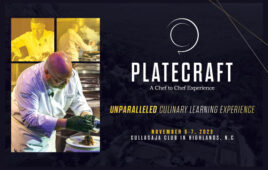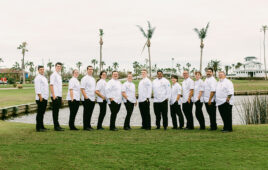 When Edward Leonard, CMC and Executive Chef at Westchester Country Club in Rye, N.Y., heard that Club and Resort Business has become an important informational source for managers in our industry, he didn’t hesitate, despite a brutal peak-season schedule, to consent to this month’s “Chef to Chef” interview. This tells you a lot about a man who has dedicated his career to the development of young talent in the culinary arts.
When Edward Leonard, CMC and Executive Chef at Westchester Country Club in Rye, N.Y., heard that Club and Resort Business has become an important informational source for managers in our industry, he didn’t hesitate, despite a brutal peak-season schedule, to consent to this month’s “Chef to Chef” interview. This tells you a lot about a man who has dedicated his career to the development of young talent in the culinary arts.
Anyone hearing Ed speak at the 2nd Annual Club Chefs Institute at The Greenbrier Resort last fall (C&RB, November 2005), would have seen clearly that he has an especially strong understanding of the relationship club chefs must have with their members, house committees and Boards, as well as their own staff. And Chef Leonard certainly has impeccable credentials of his own:
- one of only 61 Certified Master Chefs in America
- Vice President of The World Association of Cooks Society
- Past President of American Culinary Federation (2001-2005)
- Manager of the 2008 National Culinary Team
- Captain, 2004 National Culinary Team (World Champions, Hot Kitchen Category and third overall out of 34 nations)
- Executive Chef and Co-owner of Cantare, a three-star Northern Italian restaurant in Chicago
- Author of five books in the last three years, including Private Club Cuisine: Cooking with a Master Chef (Wiley and Sons, 2006), and American Bounty: The Cuisine of America (published this past summer)
- Honorary Doctorate (Culinary Arts), Johnson and Wales
- Antonin Careme Epicurean Medal of Honor, 2005
- Santé magazine’s 2005 Culinarian of the Year
So when someone who is clearly one of America’s greatest chefs agrees to do an interview with you, where do you begin? After thinking about it for a second, I decided it didn’t much matter—pretty much anything I asked him would be sure to yield an interesting and informative answer. As you can see from our conversation, that clearly proved to be the case
Q Chef, you speak about creating a culture at your club. How has this made your team successful?
A Our culture of culinary pride at Westchester has a simple purpose: To facilitate quality and a standard of excellence, passion, flavorful food, a learning kitchen and a great dining experience for our members and guests. It provides a firm direction for what is expected and the standards that are demanded. And, it puts all team members on the same page. You can’t expect people to be part of the mission without a culture that defines, trains and ensures follow-through for your standards.
Another key to a successful culture is ensuring that team members want to be there and have a passion for what they’re doing. There’s nothing more dreadful than people just doing their jobs to make a paycheck. That attitude separates good cooks from bad, and is a poison that disintegrates the focus of a quality culinary program.
The value of creating and adhering to this culture, I believe, is reflected in the positive feedback we get from members, the increase in sales from all venues and surveys that indicate 97 percent satisfaction and yield comments such as, “I can’t believe I could get such food at a banquet.”
 Q Many of the “powers that be” at our clubs do not understand what we do as managers. How do you communicate to the decision-makers at your club in a business language they understand?
Q Many of the “powers that be” at our clubs do not understand what we do as managers. How do you communicate to the decision-makers at your club in a business language they understand?
A This is a good question, and your approach in this area can really make a difference in the support you get for the culinary endeavors at hand. Chefs today are not just good cooks, but managers of resources that include labor, purchasing dollars and equipment. It’s funny—years ago, when I worked for a London-based hotel and catering company, much of my training was in sales, marketing and operational management. I never realized these skills would serve me so well as a chef. But, when I first arrived at Westchester and had to meet with committee and Board members, I was prepared. I could do Power Point presentations to show the return on investment for the equipment or educational items I was requesting.
Many chefs speak like cooks who just want to pursue their artistic ways. But in presenting your requests to business people who are the decision-makers, you must show how an investment will have a payback in efficiency or quality that will be noticed, not only on the bottom line, but also by making your club more special.
Q What would you say to chefs with attitudes of, “Let’s do the same thing, it worked well last year,” or “We tried that before, it didn’t go over well”?
A I would say, “Shame on you for having an attitude that does not foster passion and the ability to exceed member’s expectations.” As a team, we have done many great events such as wine dinners—and the challenge for me as the leader is to raise the bar again and again. This takes much effort—but I?don’t ever want a member to say, “It was good, but not as good as last year’s.”
This goes back to creating a culture of pride and excellence that drives home the fact that yesterday is a memory, today is a new experience and tomorrow needs to exceed them both. Or, as a sign in my kitchen says:“To not strive to make every meal better is a short road to culinary death.”
Q I know you produce a culinary business plan annually. What do you try to highlight when presenting this plan?
A The plan includes a review of the past year, both successes and failures, and a “SWOT” analysis of our culinary Strengths, Weaknesses, Opportunities and Threats. The plan helps the culinary team know what goals we have set, and also lets the House Committee see and understand our work, how we push ourselves for the members and that the kitchen is being run as a business.
The plan also includes ideas for building revenues through new concepts. Two years ago, I proposed a WCC cafe and retail shop. It didn’t happen this year, or last. But now they have brought it back to the table, called in an architect for the design stage and asked me to redesign the concept, which we hope to have ready in 2007. So, while your proposals for concepts and capital expenses may not get approved right away, this shows that just by placing them on the burner and keeping the fire going, you never know…
 Q As a high-profile employee at your club, how do you build member relationships that “don’t cross the line”?
Q As a high-profile employee at your club, how do you build member relationships that “don’t cross the line”?
A Resting on laurels or reputation and getting comfortable is not an option for me. In fact, that’s what gets many talented people in trouble. No matter how successful you become, you must stay the same person you were yesterday. Or, more relevant to chefs, remember this saying: You never walk on water, you cook with it.
Q Teambuilding has been a huge part of your success at Westchester. How have you accomplished this?
A You need to remember
that the strength of a successful team lies not in the similarities of team members, but in their differences. You need a foundation made from different talents and different levels of crafts and skills. Then you must get everyone to cook and work together towards a common vision of quality. One key to making this work is to eliminate focusing too much on what others do. Another saying I emphasize is, “Don’t pay attention to the ‘faults’ of other culinary team members, or things they’ve done or left undone. At the end of the day, your level of excellence is all that matters.”
Q Please talk about the image you seek to project for your staff.
A The image is plain and simple, with no exceptions: Look professional at all times and follow the guidelines we have established. I want the culinary staff to be respected for their hard work and the art of their craft. To do this, one needs to look and act the part—that means no funky pants, no unclean appearance, traditional whites with the chef’s toque and apron. End of story.
Q I have heard you speak of TQF – why is this important?
A Total Quality Focus means that in everything we do, we have to achieve the standard, day in and day out. In my kitchen, it means that quality is never an accident. It’s the result of high intention, sincere effort, intelligent direction and skillful execution. It always represents the wisest choice of many alternatives.
It’s not easy to perform at a high level daily; it’s tough, hard work. But, I always tell my team that TQF means three things can’t be hidden for long: quality food, correct cooking procedures and great flavor. We have many ways to make sure these standards are met, but nothing beats just walking around, tasting, and checking—even ordering food without letting anyone know. I even have a TV?in my office, with cameras on the main kitchen and the restaurant.
If you’re going to achieve TQF consistently, you must develop proper habits, from the purchasing of products, to great mis en place, to excellent execution and plating of the finished product. Culinary excellence can’t be an exception. It has to be the prevailing attitude every day your team members step into the kitchen.




